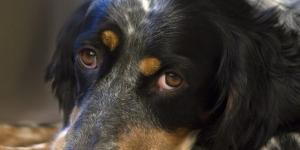Animal cardiovascular diseases
Learn more about animal cardiovascular diseases by exploring our site and become a true expert on the animal kingdom. You'll find content created for the best professionals with pictures, videos and opinions.
10 articles

Heart failure in dogs is a relatively common disorder that can affect animals of all ages. For this reason, caregivers must be attentive to any symptoms that may suggest that they suffer from heart disease. It is very important to recognize these symptoms early. Taking them to a veterinarian for diagnosis...

If you run around with your dog and pet them on the chest area, it's normal to feel their heart rate is elevated. When a dog has a rapid heart rate while resting, we might have more cause for concern. A dog's heart functions in the same basic way as our own. It will speed up or slow down depending on activity...

Some clinical symptoms of disease are more obvious than others. For example, bleeding is a visceral sign that something is wrong, even if it can be due to a wide range of issues. Other symptoms may be more subtle, but this does not make them any less important. In fact, some of the most serious pathologies...

Sinus bradycardia in dogs is an abnormally low heart rate caused by the impulses in the sinus node firing more slowly than normal. The sinus node is responsible for the electrical impulses in the heart that cause it to beat or contract. In most cases, this is a harmless condition that often occurs in...

In a healthy dog, blood circulates in an orderly manner around the blood vessels. Since the transportation of blood around the body is vital to maintain the organism itself, good circulation is essential. Not only does poor circulation prevent the proper functioning of the cardiovascular system (and,...

Pathologically, pulmonary hypertension is an underdiagnosed condition in small animal clinics characterized by elevated systolic or diastolic blood pressure in the lungs. Its occurrence may be caused by several factors, most of which are associated with cardiac or pulmonary changes that determine not...

It can be too easy to take the heart for granted. Its functioning is necessary for life, but its involuntary action means we don't have to consciously control it. This is why heart disease is described as the ‘silent killer’. When it comes to our own health, the symptoms can be very difficult to recognize. Unfortunately,...

Congestive heart failure is a big concern for humans as it is one of the biggest killers. We may not think the relatively tiny hearts of cats will suffer the same issues, but this is unfortunately not the case. Congestive heart failure is quite a self-explanatory term. The arteries and blood vessels of...

The average life of our animal companions has increased significantly thanks to the care we provide and advances in veterinary medicine. However, with the increase in life expectancy, we will have to learn to coexist with conditions that usually appear in geriatric animals.
Whether the vet has detected a...

Canine dilated cardiomyopathy is a fatal disease in which the muscle fibers contract weakly. Then, the muscles of the heart's walls become thinner and the chambers, that is, the ventricles and atria, get bigger. As a result of this disease, the heart gets bigger and loses its original shape, since its muscles...
